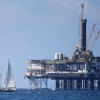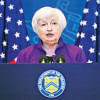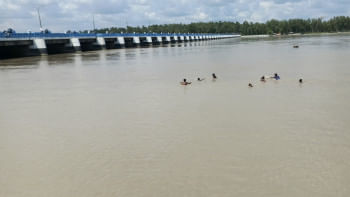Oil prices tumble as Iran fears ease, yen weakens after Japan polls

Oil prices tumbled Monday with markets relieved that Israel's strikes on Iran had avoided the country's energy infrastructure while the yen fell to a three-month low after Japan's ruling party suffered an election drubbing.
Israel carried out air strikes on military sites in Iran on Saturday in response to Tehran's October 1 missile barrage, itself retaliation for the killing of Iran-backed militant leaders and a Revolutionary Guards commander.
Iran has downplayed the attack, saying it caused "limited damage" to a few radar systems, signalling what analysts say is the Islamic republic's reluctance to escalate further.
Oil prices fell as much as five percent in early trade before paring some of their losses.
"Israel's strike, carefully avoiding energy sites, has softened fears of a full-scale conflict with Iran," said Stephen Innes, analyst at SPI Asset Management.
"Even more telling is Iran's response, downplaying the attack's impact and signaling that its warnings may have deterred any more aggressive action from Israel," he said.
"If tensions cool further or peace talks unexpectedly gain traction, we could see oil slide down to $60 per barrel as traders shift focus back to the looming 2025 supply glut—especially if China's economic stimulus underwhelms," Innes added.
Concerns about the outlook for the world's largest oil importer have added to the downward pressure on crude prices, with observers waiting for headline figures on Beijing's stimulus plan to support the wavering Chinese economy.
Investors are looking for details of any major stimulus package to be unveiled after the conclusion of a key political meeting in Beijing next week, which coincides with the US presidential election.
On currency markets the yen hit a three-month low, sliding more than one percent against the dollar as Japan's ruling coalition was projected to lose its majority in a general election.
New Prime Minister Shigeru Ishiba's gamble calling snap elections appeared to have backfired badly, with his Liberal Democratic Party projected to have fallen short of an absolute majority on its own for the first time since 2009.
Mid-morning, one dollar bought 153.88 yen, the Japanese currency's lowest value since late July.
In Japan the cost of living has become a political issue, Rodrigo Catril at National Australia Bank said on the Morning Call podcast.
"The general sense is that there's a risk here that the government will have to concede in terms of its fiscal discipline agenda, so in order to get more people to join the coalition, they will have to become a little more fiscally loose," he said.
"At the same time there's a risk there that support for policy normalisation for the government, in terms of the Bank of Japan policy normalisation, it may be that the LDP may not be able to be as supportive of the Bank of Japan's process. So that's the major concern particularly from the central bank perspective."
The BoJ lifted rates in March for the first time in 17 years as it moved away from its long-running ultra-loose monetary policy. A surprise second lift in July sparked turmoil in markets.
The yen's weakness boosted Japanese shares, as exporters benefit from a cheaper currency, with Tokyo up 1.5 percent.
Asian markets were mostly higher, with Shanghai, Seoul, Kuala Lumpur, Bangkok and Manila all in the green while Hong Kong, Taipei, Jakarta retreated. Sydney and Singapore were flat.

 For all latest news, follow The Daily Star's Google News channel.
For all latest news, follow The Daily Star's Google News channel. 








Comments